Do you identify based on how you feel, or how others see you?
Thoughts of being Mixed-race, Black and British.
For a long time I had an insecurity that I “was not Black enough”. Being of dual heritage, both Black and White, seemed to allow others to call into question my Blackness - even though I have always identified as both Black and mixed-race. Those perceived challenges to how I felt and how I saw myself, created an abundance of self-doubt which eventually turned to shame and sadness. I’d like to share with you more on this insecurity and ask the question, do you identify based on how you feel, how others see you, or both? Or are these questions you’ve never felt necessary to think about, let alone answer, or be challenged on publicly?
Today and in this specific area, I feel more confident in how I identify and my ability to not let anyone else doubt myself, however it is still a topic that can cause my anxiety to rise if I ever get the feeling that my Blackness is being challenged. While the examination on my Blackness is not the case for the majority of people I've interacted with, it happened enough times growing up to create a seed of doubt and a lot of self-questioning. For a time, that insecurity grew and grew as I’d experience more and more people commenting on how Black I did or didn’t seem.
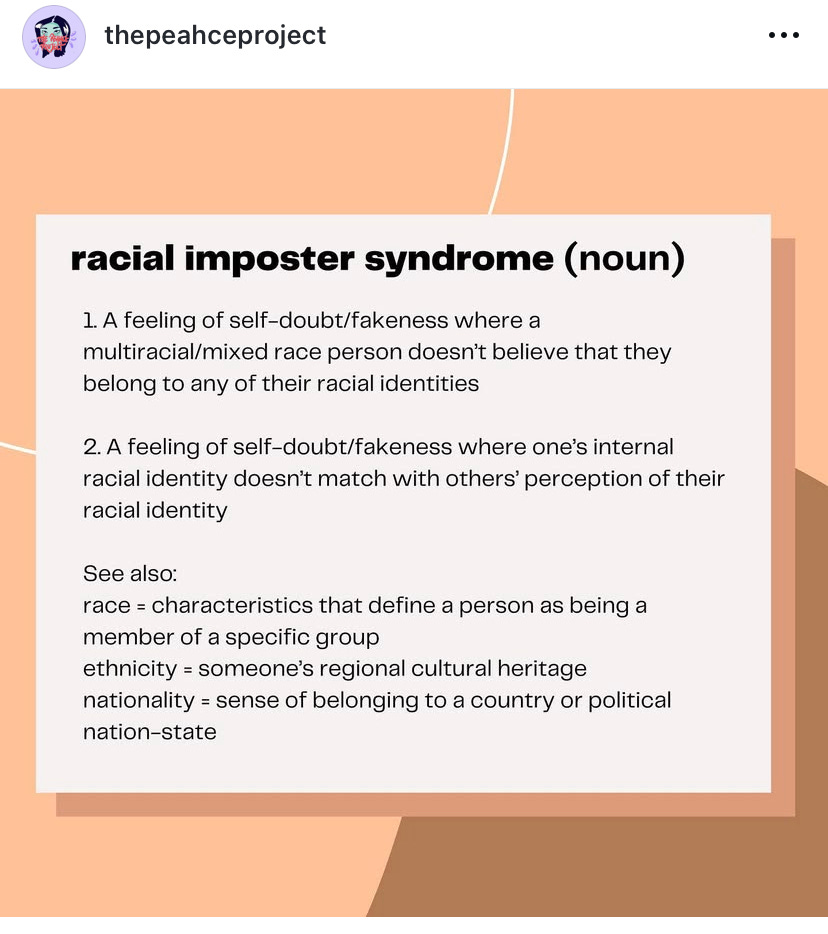
In White Spaces
Comments that implied that I wasn’t Black enough, have come from both White and Black people. In White spaces, I’ve been perceived to not be Black enough for the following reasons…
My ability to “speak well”.
Being “kind, friendly and polite”.
Not being able to sing, although I beg to differ and my eldest says she loves my singing voice!
Not being able to name every Hip Hop artist known to man.
The fact that I don’t eat chicken all the time…
When I think of these examples in hindsight, I can’t believe I let them both affect me so much. They range from the ridiculous, to being rooted in racism and stereotypical views of what a few believed a Black person to be. For context, these examples are mostly from the 90s in a predominantly White area just outside of London UK. Some of these comments were delivered in ‘jest’, while others were apparently ‘compliments’.

The backhanded ‘compliment’
At the time, and especially as a child, I couldn’t understand why such ‘compliments’ left me feeling uncomfortable, angry and sad all at once. At the time, I didn’t understand how such comments were not ideas I should take on as problems I needed to fix in order to be Black, they were simply revealing of the bigotry and racist views held by the person I was speaking to.
“Here I was seemingly similar to them, not different, not other, not “foreign”.
During my school years, they were revealing of the bigotry and racist views that some would hear at home with their families. Those same children I went to school with became mouthpieces of those ideologies. As we got older and moved through the school years together, it became clear who believed the racist lies they were fed and who refused to take on those racist’s views as their own.

In ‘complimenting’ me, some appeared to be questioning how this person in front of them didn’t match all they had been told about Black people, especially when those ‘truths’ about Black people were negative; yet here I was, being someone they liked and connected with. Here I was seemingly similar to them, not different, not other, not “foreign”.
In Black Spaces
In Black spaces, my Blackness has been challenged because I am mixed-race and I am part White. It is a fact I've never tried to hide. For some, having White DNA calls into question whether I am allowed to say I’m Black. The experiences I've had in Black spaces with this regard has been to question my Blackness in terms of the privileges I’ve held because of my White heritage and lighter skin tone. This for me is where I feel the most anxiety and pain, because those things are true. I am part White and I do have lighter Brown skin compared to many who are Black and not mixed-race. I have experienced those privileges that unfairly come because of those facts. That ‘privilege’ is a symptom of racism’s offshoot, colourism, and none of that is acceptable.
Colourism
I have seen and felt it first hand that some (White and Asian people) will treat and speak to me differently - and better - because they don't see me as really Black and for them that can mean I’m less of all the racist things they view about Black people. Having a lighter skin tone and being part White, for some, means I’m less ‘threatening’ or ‘more like them’; which is obviously racist nonsense (to put it mildly).
“Colourism is the daughter of racism… in a world that rewards lighter skin over darker skin.” Lupita Nyong’o
In Black spaces, for a few, my White side and lighter skin tone means I can not identify as Black and I will never know what it's like to be “actually Black”. This has been said to me in relation to my experience, or perceived lack of experience, with racism.
The truth is, my experience is different from someone who is dark-skinned and Black. That same experience will also be different if that person has grown up in a majority Black or White area. Racism and colourism have made it incredibly likely that I won't experience as much racism as a dark-skinned Black person. I will always have empathy for Black and dark-skinned people who face those prejudices and violence even more than I have done, simply because they are darker than me. That will never be ok and that is never something I’d forget or discredit. In discussing my own experiences of racism, I’m very conscious of these hard, unjust and sad facts.
Food for thought
In regards to being questioned on my Blackness in Black spaces, by a minority, I also wonder if this questioning comes because for many, their experiences of racism have come from White people or perhaps even a mixed-race person. Therefore, in theory, how can I be part White and not racist? I have also wondered if this is more unique to London as opposed to other parts of the UK and further afield. I say this because I have lived in and outside of London and the majority of the challenges I've had in Black spaces have mostly been in London, but perhaps that is just coincidence and the fact that there are more Black people living in London when compared to the other locations I’ve lived and worked in?
In majority White spaces I’m often seen as Black, while in majority Black spaces, I’m often seen as mixed-race. I have no problem with either and while I have used both terms interchangeably for as long as I remember, I have wondered if this has always been how I viewed myself? Or did the slight differences in how I was perceived in both spaces influence how I identified?
In looking back on this worry I carried for a long time, I never checked in with myself and asked how I felt. I never had the confidence to dust off the comments and not dwell on them. I never asked, Black enough for who?
Sharing my insecurity and the reactions I’ve had
In addition to this, there are those close to me - from White, Black and mixed-race backgrounds - who I have confided in regarding this once concern of mine. Each time the reaction as been similar to “No Chloe!! Why would you ever doubt yourself?” Which then makes me question the state of my mental health, which I’m always working on!
Other replies have been along the lines of…
No one thinks like this, of course you’re Black and your mum is White.
You’re clearly mixed-race and Black, don’t overthink it.
I’ve had that too, so now I just say I’m mixed-race instead of saying I’m Black as well.
I’ve never thought about it or had anyone say anything like that to me, but I guess that’s because I’ve always had both Black and White family around me all the time and it is what it is.
Isn’t this all kind of obvious, I don’t understand why anyone would question you on it? You’re clearly Black.
What does it matter? You’re just Chloe, you’re one of us.
The language we used
I’m also conscious of language we use in describing ourselves and the debate on whether the term “mixed-race” is problematic in itself. For those with Black heritage, are we all “Black” regardless of any other DNA we may have, or is that disrespectful to those who are not “mixed” or “bi-racial”?
I’ve had some share with me that we should stop using the term “mixed-race” because we are all part of the human race, however does that then invalidate the experience of those who are “mixed” and the complexities that can arise from that with regard to identity? Does that invalidate the experiences of being Black?
Is there a word or phrase that I’ve not used that better portrays all of this and the different mixed-race identities and experiences that exist? Or are these ways of thinking something we should simply put to bed and accept others for how they see themselves and identify? Is it more a question of accepting others, as opposed to examining the language they use to describe themselves? Is it more a question of being respectful of how others see themselves and not asking them to explain themselves?
Why did it upset me for others to not see me as Black?
Firstly, the notion of not being Black enough upset me because I felt Black. Black is how I identified and saw myself. Before going to school and being in a mostly White environment, which had not been the case before then, I had thought of myself as Black - just like my daddy but a bit lighter. There was nothing else to it. While my mum is White, at that point in time, I was mostly interacting with my Dad’s Black family and friends. I didn’t see myself as any different from them. At that time, it was my mum who was the ‘odd’ one out, but it was a difference that was never seen as a negative. It was just how my family was and who we were.
When I started school, not only did I become immersed in a predominantly White environment, it was at the same time that my dad died. To say I wasn’t Black felt as though people were severing the tie I had to him. That tie was and remains precious and one I’ll always be proud of and defend to the death.
It would be a few years on from starting school that I would really feel my mum’s negative thoughts on my Black heritage and physical traits. However, what I had already learnt from my narcissistic mum was how to doubt myself. There was a time I remember feeling confident in my identity, but thanks to the constant berating from my mum, it didn’t take much for me to feel as though I was never enough.
I now have a greater understanding of how a narcissistic mother can impact the self-confidence and self-worth of their children. In this context, it’s no surprise that any negative comment made on my very being would be taken as a deep criticism and something I needed to fix, or at least remain self-conscious about. I had already been conditioned to think that there was a lot wrong with me that needed sorting. Just a few comments on how I didn’t seem Black was more than enough to start the spiral of self-doubt as to whether I really was Black enough.
While those comments weren’t by any means daily, there were enough of them throughout my formative years and well into adulthood that kept ‘validating’ that there must be very real reasons why some don’t see me as Black. My internal feeling was saying I am Black and this is how I feel, but I had been conditioned for years not to believe myself, so even on something as solid as your own identity should be, it was easy for me to call it into question and think I must be the problem.
Then I’d remember the obvious contradiction that part of me was not Black, even though that’s how I felt. I am and will always be part White, too. Which is why I would always think of myself as both Black and mixed-race; but was that wrong? Was I misguided and disrespectful in thinking that way. Should I have been sticking solely to the term mixed-race?
Over the years, I’ve become more confident in how I identify, however every so often that worry I carried for many years, likes to pay me a visit. It recently happened and completely took me by surprise. In order to push through the crippling self-doubt that was evolving, I reflected once more on all I've come to learn about racism, colourism and the difference between culture and heritage. While they are often spoken of as the same thing, they are not and ultimately it is down to the individual as to decide how they identify. You may disagree with it, but you can not change it or request that another changes it to suit your own beliefs. It simply must be respected.
What do you think?
I would love to know your thoughts, even though there is still a paranoid inner child of mine screaming “don't ask that, they’ll say you’re not Black enough!”
Can you relate to any of the words and experiences I’ve shared?
Is this a topic you’ve ever thought about?
What have been your main takeaways from reading my experience on this insecurity?
What is your experience with identity, racism and colourism?
Is there anything within this you think is important to raise and share?
What tips would you give on feeling confident in yourself and your identity?
Do you identify based on how you feel, how others see you, or both?
Are these questions you’ve ever felt necessary to think about, let alone answer, or be challenged on publicly?
As always, thank you so much for reading and for all your support.
Chloe x




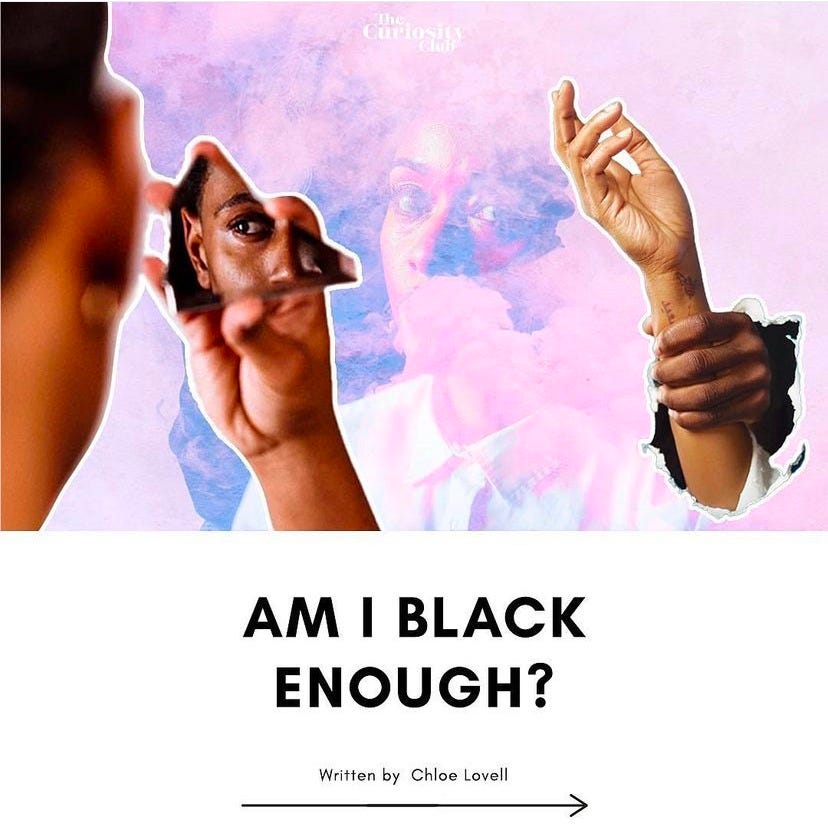
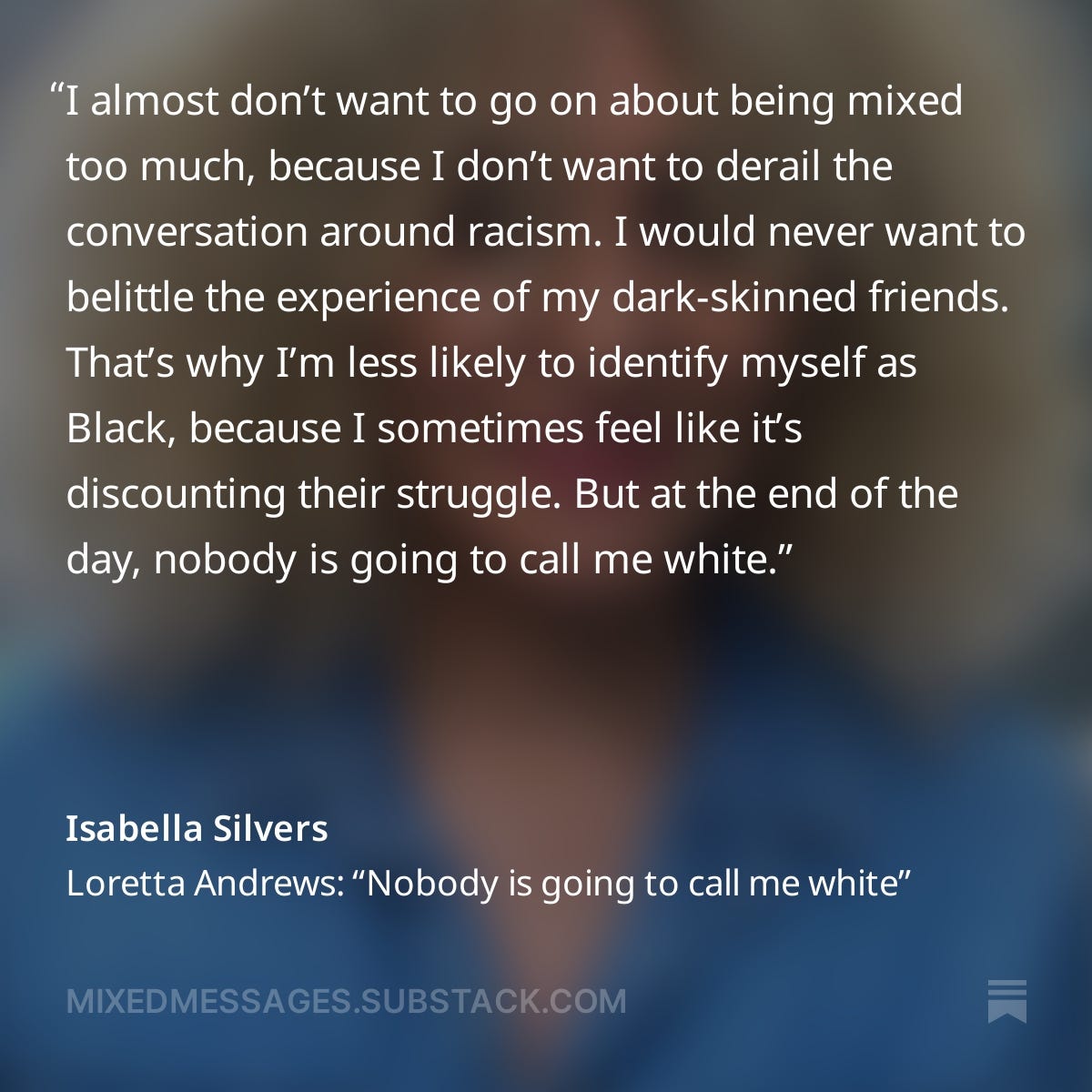
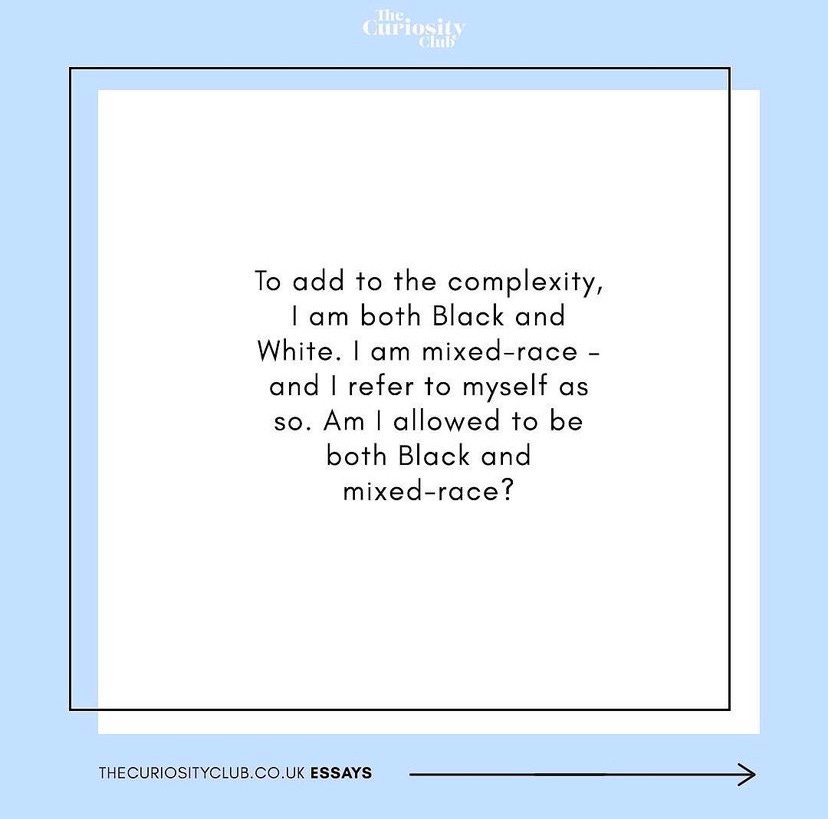
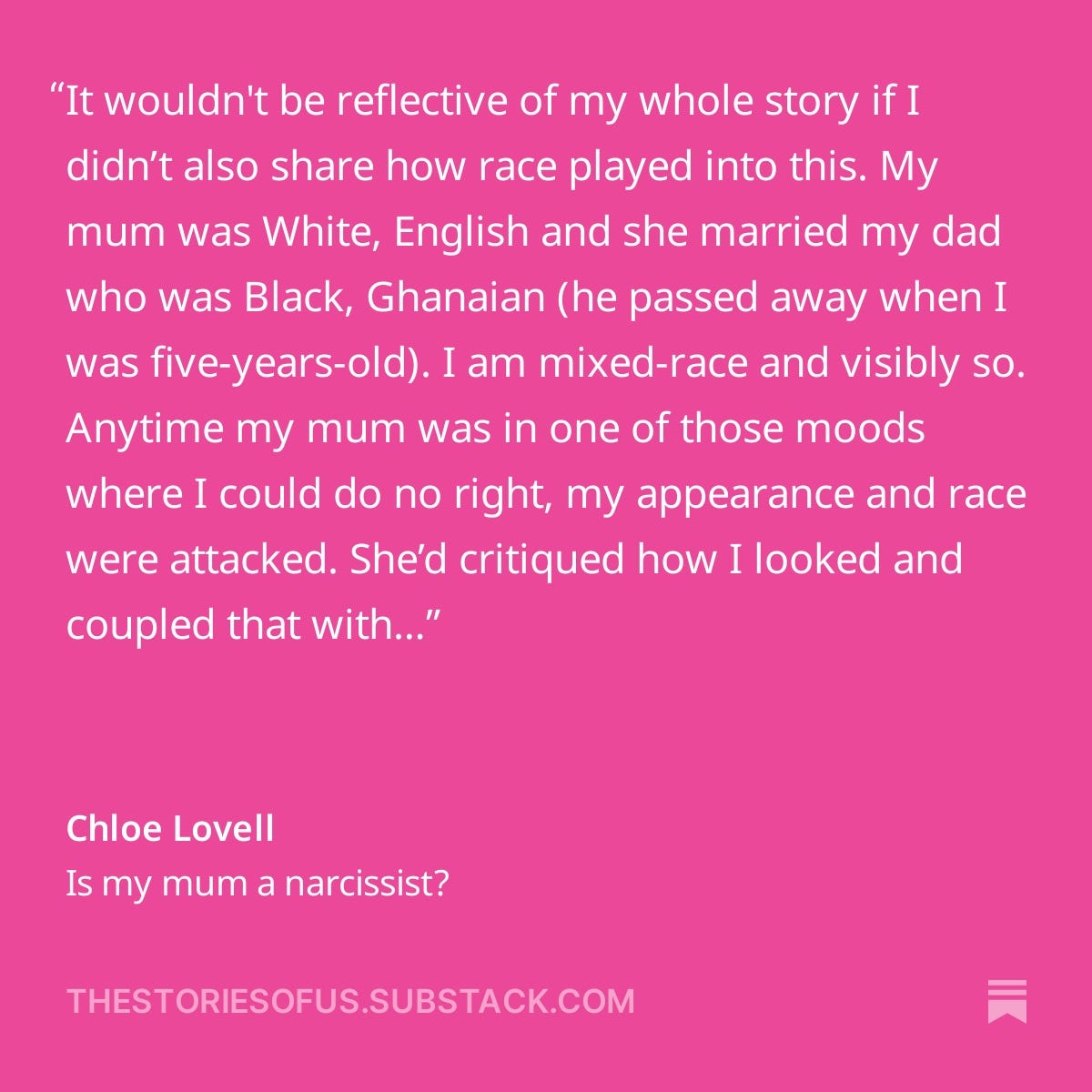
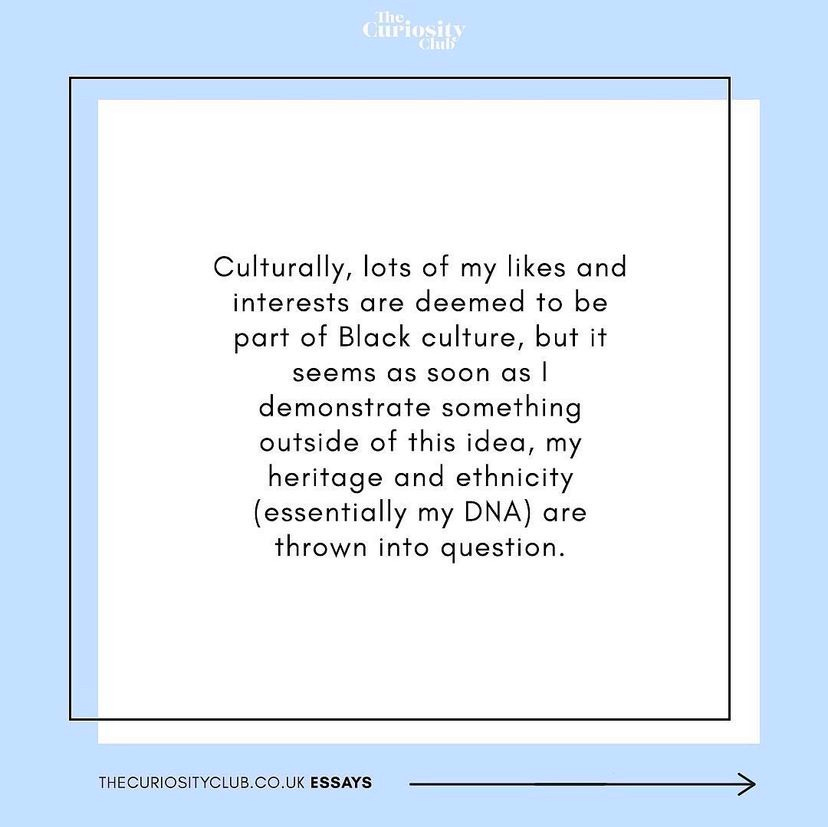
Growing up I lived in a white suburban neighborhood and my school was predominantly white. I’m fully black but everyone made me feel like I was mixed. I even would get asked by other black kids if I was fully black because of how I sounded and where I lived. I hated it. I just wanted to be what I was, which was black. I would also get the “ugh Leah you’re not like other black girls, like you’re not ghetto” “your hair is always straight and it’s yours” “you’re an Oreo” and I used to be so pretentious about it until I got older and realized this was disrespectful and discriminatory. Then of course being in black circles I would get “why is your hair so long!” There was no way to win. I was so happy after I got into college and I could discover myself fully.
Now that I’m adult, married, and wanting my own kids, I want to be so careful on the words that I say. My husband is white so they will see the world in a completely different way. I worry about it sometimes, but I’m praying I can bring joy and uplift them in anyway they need. I loved your post I connect with it so much!